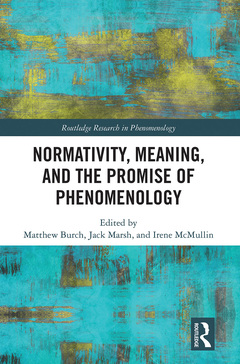Description
Normativity, Meaning, and the Promise of Phenomenology
Routledge Research in Phenomenology Series
Language: English
Subject for Normativity, Meaning, and the Promise of Phenomenology:
Keywords
Heidegger’s Sein Und Zeit; Transcendental Phenomenological Approach; Matthew Burch; Hua IV; Jack Marsh; Practical Identity; Irene McMullin; Transcendental Phenomenology; Sara Heinämaa; Relaxed Naturalism; John Drummond; Authentic Dasein; Glenda Satne; Nonhuman Animals; Bernardo Ainbinder; Transcendental Subjectivity; Charles Siewert; Categorial Intuition; Walter Hopp; Idea II; Joseph Schear; Erotic Inception; Dermot Moran; Husserl’s Transcendental Idealism; Joseph Rouse; Pre-reflective Self-awareness; Mark Okrent; Metaphysically Neutral; Dan Zahavi; Moral Principles; David Cerbone; Normative Turn; Inga Römer; Existential Death; Martin Kavka; Constitutive Norms; Leslie MacAvoy; Self-directed Anger; Steven Crowell; Husserl’s Account; phenomenology; Heidegger’s Account; normativity; Classical Phenomenologists; epistemology; Resolute Dasein; philosophy of mind; Pure Practical Reason; action theory; philosophy of religion; moral psychology; meaning; Husserl; Heidegger; intentionality; autonomy; transcendental; experience; moral normativity; authenticity; selfhood; self-deception; Scheler; Edith Stein; Dreyfus; Sartre; Merleau-Ponty; Levinas; French phenomenology
Publication date: 06-2021
· 15.2x22.9 cm · Paperback
Publication date: 06-2019
· 15.2x22.9 cm · Hardback
Description
/li>Contents
/li>Readership
/li>Biography
/li>
The aim of this volume is to critically assess the philosophical importance of phenomenology as a method for studying the normativity of meaning and its transcendental conditions. Using the pioneering work of Steven Crowell as a springboard, phenomenologists from all over the world examine the promise of phenomenology for illuminating long-standing problems in epistemology, the philosophy of mind, action theory, the philosophy of religion, and moral psychology. The essays are unique in that they engage with the phenomenological tradition not as a collection of authorities to whom we must defer, or a set of historical artifacts we must preserve, but rather as a community of interlocutors with views that bear on important issues in contemporary philosophy.
The book is divided into three thematic sections, each examining different clusters of issues aimed at moving the phenomenological project forward. The first section explores the connection between normativity and meaning, and asks us to rethink the relation between the factual realm and the categories of validity in terms of which things can show up as what they are. The second section examines the nature of the self that is capable of experiencing meaning. It includes essays on intentionality, agency, consciousness, naturalism, and moral normativity. The third section addresses questions of philosophical methodology, examining if and why phenomenology should have priority in the analysis of meaning. Finally, the book concludes with an afterword written by Steven Crowell.
Normativity, Meaning, and the Promise of Phenomenology will be a key resource for students and scholars interested in the phenomenological tradition, the transcendental tradition from Kant to Davidson, and existentialism. Additionally, its forward-looking focus yields crucial insights into pressing philosophical problems that will appeal to scholars working across all areas of the discipline.
Introduction
Matthew Burch, Jack Marsh, and Irene McMullin
Section I: Normativity, Meaning, and the Limits of Phenomenology
1. Constitutive, Prescriptive, Technical or Ideal? On the Ambiguity of the Term ‘Norm’
Sara Heinämaa
2. The Space of Meaning, Phenomenology, and the Normative Turn
Leslie MacAvoy
3. Mind, Meaning and Metaphysics: Another Look
Dan Zahavi
4. Ground, Background, and Rough Ground: Dreyfus, Wittgenstein, and Phenomenology
David Cerbone
5. Inauthentic Theologizing and Phenomenological Method
Martin Kavka
Section II: Sources of Normativity
6. Intentionality and (Moral) Normativity
John Drummond
7. The Sources of Practical Normativity Reconsidered – with Kant and Levinas
Inga Römer
8. Resoluteness and Gratitude for the Good
IreneMcMullin
Section III: Normativity and Nature
9. On Being a Human Self
Mark Okrent
10. Normativity with a Human Face: Placing Intentional Norms and Intentional Agents back in Nature
Glenda Satne & Bernardo Ainbinder
11. World-Articulating Animals
Joseph Rouse
Section IV: Attuned Agency
12. Moods as Active
Joe Schear
13. Against Our Better Judgment
Matthew Burch
14. Everyday Eros: Toward a Phenomenology of Erotic Inception
Jack Marsh
Section V: Epistemic Normativity
15. Normativity and Knowledge
Walter Hopp
16. Appearance, Judgment, and Norms
Charles Siewert
17. Husserl’s and Heidegger’s Transcendental Projects: From the Natural Attitude to Functioning Intentionality
Dermot Moran
Afterword
A Philosophy of Mind: Phenomenology, Normativity, and Meaning
Steven Crowell
Matthew Burch is a philosophy lecturer at the University of Essex. His research interests lie at the intersection of phenomenology and the cognitive and social sciences. He has published in Inquiry, The European Journal of Philosophy, and Phenomenology and the Cognitive Sciences. He is currently a Research Fellow with the Independent Social Research Foundation.
Jack Marsh is a St. Leonard’s Scholar in Religion at the University of St. Andrews. He is the author of Saying Violence: Levinas, Chauvinism, Disinterest (forthcoming). His work has appeared in many journals, including Philosophy and Social Criticism, Levinas Studies, and Philosophy Today.
Irene McMullin teaches philosophy at the University of Essex. She specializes in Ethics and 20th Century European philosophy. In 2013 she published Time and the Shared World: Heidegger on Social Relations. Her second book, Existential Flourishing: A Phenomenology of the Virtues, is forthcoming.




